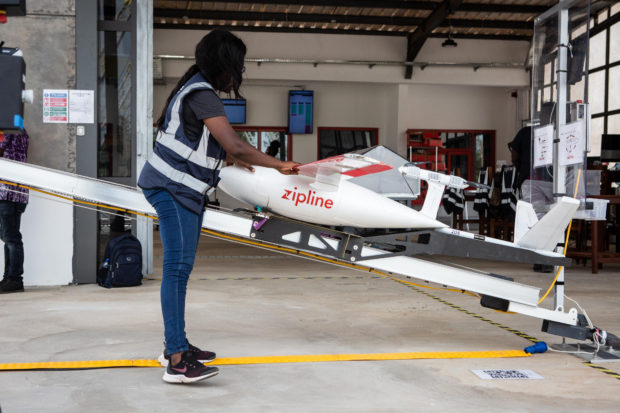
A staff member prepares a drone for the delivery of medical supplies at the drone delivery service base run by operator Zipline in Omenako, 70 kilometres (40 miles) north of Accra on April 23, 2019. AFP
ACCRA — Ghana launched a fleet of drones Wednesday to carry medical supplies to remote areas, with President Nana Akufo-Addo declaring it would become the “world’s largest drone delivery service.”
The craft are part of an ambitious plan to leapfrog problems of medical access in a country with poor roads.
READ: Hospital Using Drones to Fly Blood Samples Between Buildings
“No one in Ghana should die because they can’t access the medicine they need in an emergency,” Akufo-Addo said in a statement to mark the launch.
“That’s why Ghana is launching the world’s largest drone delivery service,” Akufo-Addo said. “It represents a major step towards giving everyone in this country universal access to lifesaving medicine.”
The drones have been flying test runs with blood and vaccines, but the project was officially inaugurated Wednesday at the main drone base in Omenako, 70 kilometers (40 miles) north of Accra.
Omenako is the first of four distribution centers which, when fully operational, will each have 30 drones serving 500 clinics within an 80-kilometer (50-mile) radius.
Operator Zipline, a US-based company, said the three other sites should be up and running by the end of 2019.
The drones are planned to ferry 150 different medicines, blood, and vaccines to more than 2,000 clinics serving over 12 million people — roughly 40 percent of the population.
Bumpy roads
Zipline first began delivering blood and medicine in East Africa in 2016, deploying drones in Rwanda, a country dubbed the “land of a thousand hills” where access to many villages by road is difficult.
Now the company is expanding on the other side of the continent.
“Millions of people across the world — in both developed and developing countries — die each year because they can’t get the medicine they need when they need it,” said Zipline boss Keller Rinaudo.
For Ghana, a country of nearly 30 million people scattered across a land area about the size of former colonial ruler Britain, poor roads and a lack of ambulances are major challenges to health care access.
Drones, not dependent on bumpy roads that can take hours to navigate, offer a way to get medical supplies to clinics before a patient bleeds to death, for example.
“We are a developing country,” said Douglas Adu-Fokuo, a spokesman for the Ghana Health Service, noting that almost a third of maternal deaths are due to blood loss — easily preventable with a transfusion provided supplies are available.
“We can’t achieve everything in one go,” he added. “We have to start somewhere.”
Parachute drops
The four-year contract to Zipline has a hefty price tag of $12.5 million (11 million euros).
But the company says the cost is “on par with the current cost of delivery, which is usually a car, truck or motorcycle”, yet faster and more reliable.
https://twitter.com/Vaccines/status/1121080443657445378
Medics can order blood or medicine by sending a message by mobile phone.
Each battery-powered flying machine has a delivery distance of 80 kilometers (50 miles), speeding at 100 kilometers (62 miles) an hour and carry up to 1.7 kilograms (3.7 pounds).
Each drop can bring three units of blood, with deliveries made by parachute.
The drones are stoked at their depot to ensure that vaccines and supplies are kept cold, cutting the need for expensive cold-chain storage systems in remote areas.
Once the program is up and running, plasma deliveries can be made for the first time to Ghana’s most remote northern areas. The journey by road was too long, and the expiry date of plasma too short, to make this possible until now.